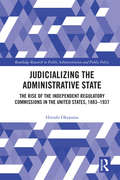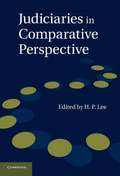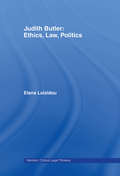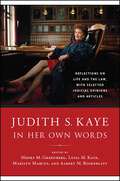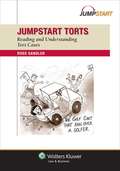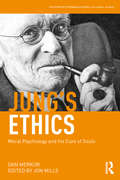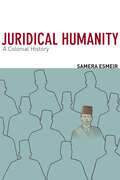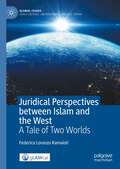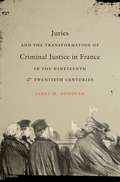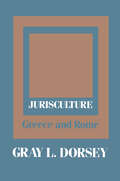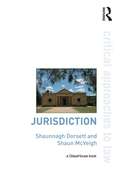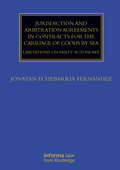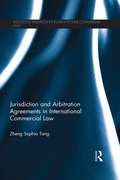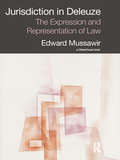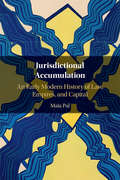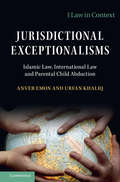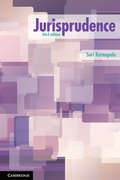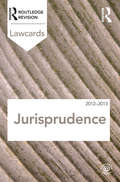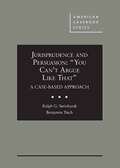- Table View
- List View
Judicializing the Administrative State: The Rise of the Independent Regulatory Commissions in the United States, 1883-1937 (Routledge Research in Public Administration and Public Policy)
by Hiroshi OkayamaA basic feature of the modern US administrative state taken for granted by legal scholars but neglected by political scientists and historians is its strong judiciality. Formal, or court-like, adjudication was the primary method of first-order agency policy making during the first half of the twentieth century. Even today, most US administrative agencies hire administrative law judges and other adjudicators conducting hearings using formal procedures autonomously from the agency head. No other industrialized democracy has even come close to experiencing the systematic state judicialization that took place in the United States. Why did the American administrative state become highly judicialized, rather than developing a more efficiency-oriented Weberian bureaucracy? Legal scholars argue that lawyers as a profession imposed the judicial procedures they were the most familiar with on agencies. But this explanation fails to show why the judicialization took place only in the United States at the time it did. Okayama demonstrates that the American institutional combination of common law and the presidential system favored policy implementation through formal procedures by autonomous agencies and that it induced the creation and development of independent regulatory commissions explicitly modeled after courts from the late nineteenth century. These commissions judicialized the state not only through their proliferation but also through the diffusion of their formal procedures to executive agencies over the next half century, which led to a highly fairness-oriented administrative state.
Judiciaries in Comparative Perspective
by H. P. LeeAn independent and impartial judiciary is fundamental to the existence and operation of a liberal democracy. Focussing on Australia, Canada, New Zealand, South Africa, the United Kingdom and the United States, this comparative study explores four major issues affecting the judicial institution. These issues relate to the appointment and discipline of judges; judges and freedom of speech; the performance of non-judicial functions by judges; and judicial bias and recusal, and each is set within the context of the importance of maintaining public confidence in the judiciary. The essays highlight important episodes or controversies affecting members of the judiciary to illustrate relevant principles.
Judith Butler: Ethics, Law, Politics (Nomikoi: Critical Legal Thinkers)
by Elena LoizidouThe first to use Judith Butler’s work as a reading of how the legal subject is formed, this book traces how Butler comes to the themes of ethics, law and politics analyzing their interrelation and explaining how they relate to Butler’s question of how people can have more liveable and viable lives. Acknowledging the potency and influence of Butler’s ‘concept’ of gender as process, which occupies a well developed and well discussed position in current literature, Elena Loizidou argues that the possibility of people having more liveable and viable lives is articulated by Butler within the parameters of a sustained agonistic relationship between the three spheres of ethics, law and politics. Suggesting that Butler’s rounded understanding of the interrelationship of these three spheres will enable critical legal scholarship, as well as critical theory more generally, to consider how the question of life’s unsustainable conditions can be rethought and redressed, this book is a key read for all students of legal ethics, political philosophy and social theory.
Judith S. Kaye in Her Own Words: Reflections on Life and the Law, with Selected Judicial Opinions and Articles (Excelsior Editions)
by Judith S. KayeIn 1983, Judith S. Kaye (1938–2016) became the first woman appointed to the Court of Appeals, New York's highest court. Ten years later, she became the first woman to be appointed chief judge of the xourt, and by the time she retired, in 2008, she was the longest-serving chief judge in the court's history. During her long career, she distinguished herself as a lawyer, jurist, reformer, mentor, and colleague, as well as a wife and mother. Bringing together Kaye's own autobiography, completed shortly before her death, as well as selected judicial opinions, articles, and speeches, Judith S. Kaye in Her Own Words makes clear why she left such an enduring mark upon the court, the nation, and all who knew her.The first section of the book, Kaye's memoir, focuses primarily on her years on the Court of Appeals, the inner workings of the court, and the challenges she faced, as chief judge, in managing a court system populated by hundreds of judges and thousands of employees.The second section, a carefully chosen selection of her written opinions (and occasional dissents), reveals how she guided the law in New York State for almost a quarter century with uncommon vision and humanity. Her decisions cover every facet of New York and federal law and have often been quoted and followed nationally.The final section of the book includes selections from her numerous articles and speeches, which cover the field, from common law jurisprudence to commercial law to constitutional analysis, all with an eye to the future and, above all, how the law can best affect the everyday lives of people who come to court—willingly or unwillingly—including, not least, those most in need of the law."An extraordinary woman, jurist, and leader who had a striking impact on the law and the administration of justice in New York State and beyond. This collection is more than a simple record of a remarkable life. It is a treasure—not only for those of us who knew and admired Judith but for all who may seek to understand and appreciate the profound impact she had on the law, the legal profession, and the administration of justice." — from the Foreword by Honorable Janet DiFiore
Juli Zeh: Text und Engagement (Kontemporär. Schriften zur deutschsprachigen Gegenwartsliteratur #15)
by Erik SchillingJuli Zeh verbindet zwei öffentliche Rollen: Sie ist Schriftstellerin und Juristin; sie trägt maßgeblich zur deutschsprachigen Gegenwartsliteratur bei, nimmt aber auch aktiv als ‚public intellectual‘ an öffentlichen Debatten teil. Der vorliegende Band untersucht daher gattungs- und literaturgeschichtliche Themen ebenso wie intertextuelle und theoretische Referenzpunkte, etwa zu Recht und Staat oder aktuellen gesellschaftlichen Aushandlungsprozessen.Juli Zehs Werk, für Bühne und Film adaptiert sowie in zahlreiche Sprachen übersetzt und inzwischen auch Schullektüre, umfasst ein breites Spektrum an Texten: Einige arbeiten mit den Mustern der Spannungsliteratur („Adler und Engel“, „Schilf“), andere lassen sich als dystopische Romane verstehen („Corpus Delicti“, „Leere Herzen“). Jüngst sind mehrere Gesellschaftsstudien zu verzeichnen („Unterleuten“, „Über Menschen“, „Zwischen Welten“). Der Band untersucht dies sowohl in Einzeltextanalysen als auch in systematischen Beiträgen, die Juli Zehs Werke vergleichend sowie im ästhetischen, medialen oder politischen Kontext in den Blick nehmen.
Julie Tudor Is Not a Psychopath: a hilarious new crime thriller debut for 2025 - meet your unlikely new heroine...If you loved Eleanor Oliphant Is Completely Fine, you will adore this!
by Jennifer Holdich'Murder has no right to be this funny. Imagine Hannibal Lecter as written by Victoria Wood. Perfect for fans of Caroline Kepnes and CJ Skuse' ERIN KELLY'A wickedly funny and darkly compelling debut' JOANNA WALLACEJulie Tudor is NOT a Psychopath.Julie Tudor is 49 and has it all: a fantastic job (well-maintained spreadsheets are the lynchpin of an efficient office), a beautiful house (some may wonder how she got the money for it, but nothing has been proved) and the man of her dreams. Julie Tudor is NOT a Stalker. Sean is 25 and the love of Julie's life. The only problem is, he thinks he's in love with someone else. And Julie Tudor is definitely, definitely NOT a Serial Killer. But Julie has found herself in a similar situation before. And if there's one thing Julie knows, it's how to get rid of the competition... After all, what's a little murder in the name of true love? Readers LOVE Julie Tudor:'From the very first page, I was hooked and unable to put it down' ⭐⭐⭐⭐⭐'What a perfect read!' ⭐⭐⭐⭐⭐'THIS BOOK IS LITERAL INSANITY!!!!' ⭐⭐⭐⭐⭐'This was SO GOOD' ⭐⭐⭐⭐⭐'This one's a must-read!' ⭐⭐⭐⭐⭐
Julie Tudor Is Not a Psychopath: a hilarious new crime thriller debut for 2025 - meet your unlikely new heroine...If you loved Eleanor Oliphant Is Completely Fine, you will adore this!
by Jennifer Holdich'Murder has no right to be this funny. Imagine Hannibal Lecter as written by Victoria Wood. Perfect for fans of Caroline Kepnes and CJ Skuse' ERIN KELLY'A wickedly funny and darkly compelling debut' JOANNA WALLACEJulie Tudor is NOT a Psychopath.Julie Tudor is 49 and has it all: a fantastic job (well-maintained spreadsheets are the lynchpin of an efficient office), a beautiful house (some may wonder how she got the money for it, but nothing has been proved) and the man of her dreams. Julie Tudor is NOT a Stalker. Sean is 25 and the love of Julie's life. The only problem is, he thinks he's in love with someone else. And Julie Tudor is definitely, definitely NOT a Serial Killer. But Julie has found herself in a similar situation before. And if there's one thing Julie knows, it's how to get rid of the competition... After all, what's a little murder in the name of true love? Readers LOVE Julie Tudor:'From the very first page, I was hooked and unable to put it down' ⭐⭐⭐⭐⭐'What a perfect read!' ⭐⭐⭐⭐⭐'THIS BOOK IS LITERAL INSANITY!!!!' ⭐⭐⭐⭐⭐'This was SO GOOD' ⭐⭐⭐⭐⭐'This one's a must-read!' ⭐⭐⭐⭐⭐
Jumpstart Torts: Reading and Understanding Tort Cases
by Ross SandlerThe JumpStart series supplies the context and prepares students to apply the rules in a litigation context. Titles in the series can be used as a general introduction to law school or as an introduction to torts.
Jung's Ethics: Moral Psychology and his Cure of Souls (Philosophy and Psychoanalysis)
by Dan MerkurThis volume presents the first organized study of Jung's ethics. Drawing on direct quotes from all of his collected works, interviews, and seminars, psychoanalyst and religious scholar Dan Merkur provides a compendium of Jung’s thoughts on various topics and themes that comprise his theoretical corpus—from the personal unconscious, repression, dreams, good and evil, and the shadow, to collective phenomena such as the archetypes, synchronicity, the psychoid, the paranormal, God, and the Self, as well as his contributions to clinical method and technique including active imagination, inner dialogue, and the process of individuation and consciousness expansion. The interconnecting thread in Merkur's approach to the subject matter is to read Jung’s work through an ethical lens. What comes to light is how Merkur systematically portrays Jung as a moralist, but also as a complex thinker who situates the human being as an instinctual animal struggling with internal conflict and naturalized sin. Merkur exposes the tension and development in Jung’s thinking by exploring his innovative clinical-technical methods and experimentation, such as through active imagination, inner dialogue, and expressive therapies, hence underscoring unconscious creativity in dreaming, symbol formation, engaging the paranormal, and artistic productions leading to expansions of consciousness, which becomes a necessary part of individuation or the working through process in pursuit of self-actualization and wholeness. In the end, we are offered a unique presentation of Jung’s core theoretical and clinical ideas centering on an ethical fulcrum, whereby his moral psychology leads to a cure of souls. Jung’s Ethics will be of interest to academics, scholars, researchers, and practitioners in the fields of Jungian studies and analytical psychology, ethics, moral psychology, philosophy, religious studies, and mental health professionals focusing on the integration of humanities and psychoanalysis.
Juno's Aeneid: A Battle for Heroic Identity (Martin Classical Lectures #36)
by Joseph FarrellA major new interpretation of Vergil's epic poem as a struggle between two incompatible versions of the Homeric heroThis compelling book offers an entirely new way of understanding the Aeneid. Many scholars regard Vergil's poem as an attempt to combine Homer’s Iliad and Odyssey into a single epic. Joseph Farrell challenges this view, revealing how the Aeneid stages an epic contest to determine which kind of story it will tell—and what kind of hero Aeneas will be.Farrell shows how this contest is provoked by the transgressive goddess Juno, who challenges Vergil for the soul of his hero and poem. Her goal is to transform the poem into an Iliad of continuous Trojan persecution instead of an Odyssey of successful homecoming. Farrell discusses how ancient critics considered the flexible Odysseus the model of a good leader but censured the hero of the Iliad, the intransigent Achilles, as a bad one. He describes how the battle over which kind of leader Aeneas will prove to be continues throughout the poem, and explores how this struggle reflects in very different ways on the ethical legitimacy of Rome’s emperor, Caesar Augustus.By reframing the Aeneid in this way, Farrell demonstrates how the purpose of the poem is to confront the reader with an urgent decision between incompatible possibilities and provoke uncertainty about whether the poem is a celebration of Augustus or a melancholy reflection on the discontents of a troubled age.
Juridical Humanity: A Colonial History
by Samera EsmeirIn colonial Egypt, the state introduced legal reforms that claimed to liberate Egyptians from the inhumanity of pre-colonial rule and elevate them to the status of human beings. These legal reforms intersected with a new historical consciousness that distinguished freedom from force and the human from the pre-human, endowing modern law with the power to accomplish but never truly secure this transition. Samera Esmeir offers a historical and theoretical account of the colonizing operations of modern law in Egypt. Investigating the law, both on the books and in practice, she underscores the centrality of the "human" to Egyptian legal and colonial history and argues that the production of "juridical humanity" was a constitutive force of colonial rule and subjugation. This original contribution queries long-held assumptions about the entanglement of law, humanity, violence, and nature, and thereby develops a new reading of the history of colonialism.
Juridical Perspectives between Islam and the West: A Tale of Two Worlds (Global Issues)
by Federico Lorenzo RamaioliThis comparative philosophy of law book aims at formulating a new analytical approach to the Islamic legal tradition based on ‘juridical categories’, a concept that facilitates comprehension and understanding of juridical phenomena. Building upon legal comparativism and legal pluralism, this project intends to avoid bias caused by universalizing Western categories when analyzing foreign juridical notions, which inevitably results in the miscomprehension of non-Western ideas and institutions. Unlike existing literature, this project will not focus on substantive comparisons between normative contents, but on the ‘juridical perspectives’ that helped to shape the Islamic and Western legal orders.The book focuses on the most relevant juridical questions regarding the Islamic and Western legal perspectives, such as the different visions regarding juridical spatiality, the role of human reason and the relationship between law, man and the divinity. While contributing to legal philosophy, this work intends also to develop and define a new interdisciplinary approach, aiming to provide a starting point for novel analyses in research fields such as legal comparativism, legal pluralism, and constitutional law. Finally, by formulating a new interdisciplinary approach, it will provide a foundational discussion of a continuously evolving subject that will never be exhaustively explored. As such, it aims at broadening scholarly reflections on the relationship between the West and Islam, eventually placing these concepts within a suitably comprehensive and contextualized framework. "Published in cooperation with gLAWcal - Global Law Initiatives for Sustainable Development, Hornchurch, Essex, United Kingdom".
Juries and the Transformation of Criminal Justice in France in the Nineteenth and Twentieth Centuries
by James M. DonovanJames Donovan takes a comprehensive approach to the history of the jury in modern France by investigating the legal, political, sociocultural, and intellectual aspects of jury trial from the Revolution through the twentieth century. He demonstrates that these juries, through their decisions, helped shape reform of the nation's criminal justice system.From their introduction in 1791 as an expression of the sovereignty of the people through the early 1900s, argues Donovan, juries often acted against the wishes of the political and judicial authorities, despite repeated governmental attempts to manipulate their composition. High acquittal rates for both political and nonpolitical crimes were in part due to juror resistance to the harsh and rigid punishments imposed by the Napoleonic Penal Code, Donovan explains. In response, legislators gradually enacted laws to lower penalties for certain crimes and to give jurors legal means to offer nuanced verdicts and to ameliorate punishments. Faced with persistently high acquittal rates, however, governments eventually took powers away from juries by withdrawing many cases from their purview and ultimately destroying the panels' independence in 1941.
Jurisculture: Greece and Rome
by Gray L. DorseyIn this first of a definitive seven-volume work to be published by Transaction, by Gray L. Dorsey, a major figure in the philos-ophy and history of law, the ancient roots of the culture of Western jurisprudence are treated. This volume explores the forma-tion and regulation of societies in early Greece and classical Rome in relation to prevailing beliefs about reality, knowing, and desiring. And while part of a series, the volume clearly stands on its own.The central question addressed in this fundamental reexamination of the organi-zation and regulation of antiquity is how, in a world in which major physical and human events are defined as in control of the gods, and with few mortals said to pos-sess such powers, did the Greeks and Ro-mans distribute decision-making powers to ensure survival and wealth? The meth-ods by which these issues are addressed is called "Jurisculture" to distinguish it from the analytical procedures of either philoso-phy or empirical social research.Jurisculture identifies sets of mean-ings that derive from premises about real-ity and human nature, and beliefs con-sidered basic in organizing and controlling that reality. This work aims at nothing less than the discovery of new interrelations between prevailing ideas of antiquity and their codification and implementation in legal institutions and principles.This volume is addressed to those people who are concerned with the wise and effective use of public discourse to ar-rive at prudent national and foreign pol-icies. Professor Dorsey discusses philosophical and social ideas, but always in the context of their implications for the prob-lems of organizing and regulating human cooperation. The emergence of the phi-losophy of law has made possible the rapid development of normative theory in the social sciences. This volume provides a powerful historical and analytical tool for this broad-sweeping development.
Jurisdiction (Critical Approaches to Law)
by Shaunnagh Dorsett Shaun McVeighThis book takes its cue from the observation that jurisdiction - as the speech of law - articulates or proclaims law. Without jurisdiction the law would be speechless, without authority and authorisation. So too would be critics who approach the law or want to live lawfully. As a field of legal knowledge and legal practice, jurisdiction is concerned with the modes of authority and the manner of the authorisation of law. It encompasses the broadest questions of the authority and the founding of legal order as well as the minutest detail of the ordering of the business of the administration and adjudication of justice. It gives us both the point of articulation of law and the technological means of the expression of law. It gives us too, the understanding of the limits of the authority of law, as well as the resources for engaging with the plurality of laws, and the means of engaging in lawful behaviour. A critical approach to law through the forms of authority and action in law provides a means of engaging with the quality of relations created and maintained through law and a means of taking responsibility for the practices of jurisdiction (and what is done in the name of the law). This book provides a critical, and historically grounded, elaboration of the key themes of jurisdiction. It does so by offering students and scholars of law a form of critical engagement with the technologies, devices and forms of jurisdictional ordering. It shows how the common has authorised legal relations and bound persons, places, and events to the body of law. It offers a number of resources and engagements of jurisdiction on the basis that a jurisprudence of jurisdiction, if it is anything, engages forms of human relation.
Jurisdiction and Arbitration Agreements in Contracts for the Carriage of Goods by Sea: Limitations on Party Autonomy (Maritime and Transport Law Library)
by Jonatan Echebarria FernándezJurisdiction and Arbitration Agreements in Contracts for the Carriage of Goods by Sea focuses on party autonomy and its limitations in relation to jurisdiction and arbitration clauses included in contracts for the carriage of goods by sea in case of any cargo dispute. The author takes the perspective of the shipping companies and the shipowners, as these are the driving forces of the shipping industry due to their strategic importance.The book provides an analysis of the existing law on the recognition and validity of jurisdiction and arbitration clauses in the contracts for the carriage of goods by sea. The author also seeks to provide conclusions and to learn lessons for the future of the non-recognition and the non-enforcement of the clauses in the existing fragmented legal framework at an international, European Union, and national level (England & Wales and Spain). The interface between the different legal regimes reveals the lack of international harmonisation and the existence of ‘forum shopping’ when a cargo interest sues the shipowner or the party to whom the shipowner charters the vessel.This concise book provides a useful overview of existing research, for students, scholars and shipping lawyers
Jurisdiction and Arbitration Agreements in International Commercial Law: Jurisdiction And Arbitration Agreements In International Commercial Law (Routledge Research in International Commercial Law)
by Zheng Sophia TangArbitration and jurisdiction agreements are frequently used in transnational commercial contracts to reduce risk, gain efficacy and acquire certainty and predictability. Because of the similarities between these two types of procedural autonomy agreements, they are often treated in a similar way by courts and practitioners. This book offers a comprehensive study of the prerequisites, effectiveness, and enforcement of exclusive jurisdiction and arbitration agreements in international dispute resolution. It examines whether jurisdiction and arbitration clauses have identical effects in private international law and whether they have been or should be given the same treatment by most countries in the world. By comparing the treatment of these clauses in the US, China, UK and EU, Zheng Sophia Tang demonstrates how, in practice, exclusive jurisdiction and arbitration agreements are enforced. The book considers whether the Hague Convention on Choice of Court Agreements could be treated as a litigating counterpart to the New York Convention, and whether it could work successfully to facilitate judicial cooperation and party autonomy in international commerce. This book breaks new ground in combining updated materials in EU, US and UK law with unique resources on Chinese law and practice. It will be valuable for academics and practitioners working in the field of private international law and international arbitration.
Jurisdiction in Deleuze: The Expression And Representation Of Law
by Edward MussawirJurisdiction in Deleuze: The Expression and Representation of Law explores an affinity between the philosophy of Gilles Deleuze and jurisprudence as a tradition of technical legal thought. The author addresses and reopens a central aesthetic problem in jurisprudence: the difference between the expression and the representation of law. Deleuze is taken as offering not just an important methodological recovery of an ‘expressionism’ in philosophy – specifically through Nietzsche and Spinoza – but also a surprisingly practical jurisprudence which recasts the major technical terms of jurisdiction (persons, things and actions) in terms of their distinctively expressive or performative modalities. In paying attention to law’s expression, Deleuze is thus shown to offer an account of how meaning may attach to the instrument and medium of law and how legal desire may be registered within the texture and technology of jurisdiction. Contributing both to a renewed transposition of Deleuze into contemporary legal theory, as well as to an emerging interest in law’s technology, institution and instrumentality in critical legal studies, Jurisdiction in Deleuze will be of considerable interest.
Jurisdictional Accumulation: An Early Modern History of Law, Empires, and Capital
by Maïa PalThe majority of European early modern empires - the Spanish, French, Dutch and English/British - are best characterised as developing practices of jurisdictional accumulation. These practices are distinguished by the three categories of extensions, transports, and transplants of authority, and this book is mostly concerned with various diplomatic and colonial agents which enabled the transports and transplants of their sovereign's authority. Through historical analyses of ambassadors and consuls in the Mediterranean based on primary and secondary material, and on the empires' Atlantic imperial expansions and conquests, the book makes two major analytical contributions. It firstly develops jurisdictional accumulation as a conceptual innovation, based, secondly, on an interdisciplinary mix of methodological angles. These intertwined contributions enable us to go beyond common binaries in both conventional and critical histories of international relations and international law through the use of a Political Marxist framework and its concept of social property relations.
Jurisdictional Exceptionalisms: Islamic Law, International Law and Parental Child Abduction (Law in Context)
by Urfan Khaliq Anver M. EmonJurisdictional Exceptionalisms examines the legal issues associated with a parent's forced removal of their children to reside in another country following relationship dissolution or divorce. Through an analysis of Public and Private International Laws, and Islamic law - historical and as implemented in contemporary Muslim Family Law States - the authors uncover distinct legal lexicons that centre children's interests in premodern Islamic legal doctrines, modern State practice, and multilateral conventions on children. While legal advocates and policy makers pursue global solutions to parental child abduction, this volume identifies fundamental obstacles, including the absence of shared understandings of jurisdiction. By examining the relevant law and practice, the study exposes the polarised politics embedded in the technical legal rules on jurisdiction. Presenting a new, innovative method in comparative legal history, the book examines the beliefs, values, histories, doctrines, institutions and practices of legal systems presumed to be in conflict with one another.
Jurisprudence
by Suri RatnapalaJurisprudence is about the nature of law and justice. It embraces studies and theories from a range of disciplines such as history, sociology, political science, philosophy, psychology and even economics. Why do people obey the law? How does law serve society? What is law's relation to morality? What is the nature of rights? This book introduces and critically discusses the major traditions of jurisprudence. Written in a lucid and accessible style, Suri Ratnapala considers a wide range of views, bringing conceptual clarity to the debates at hand. From Plato and Aristotle to the medieval scholastics, from Enlightenment thinkers to postmodernists and economic analysts of law, this important volume examines the great philosophical debates and gives insight into the central questions concerning law and justice.
Jurisprudence
by Suri RatnapalaJurisprudence offers a comprehensive overview of legal theory and philosophy. Written in plain English, it examines and demystifies the discipline's major ideas, promoting a deeper understanding of the social, moral and economic dimensions of the law. It critically assesses the major schools of jurisprudential thought throughout history and to the present, from Plato and Aristotle to Enlightenment thinkers, postmodernists and economic analysts. The book challenges students to reconsider their moral intuitions in light of established theories. This edition examines recent debates and literature in legal philosophy. It features new material on scientific advances in cognition and human behaviour in relation to the law. The book expands significantly on its discussion of natural law theory, evolutionary jurisprudence and theories of justice. Special attention is paid to the revival of theological natural law, challenges to legal positivism, assessments of Scandinavian realism and critiques of law and economics from the Austrian economic perspective.
Jurisprudence An Introduction: சட்டவியல் ஓர் அறிமுகம்
by T. Sivakumarஇந்நூலை நீதித்துறை பற்றிய அறிமுக நூல் என்று கூற முடியாது. பயணத்தின் போது அடுத்தடுத்து சிவப்பு மற்றும் மஞ்சள் விளக்குகள் நிரம்பிய நெரிசல் மிகுந்த சாலையில் குறுகிய பச்சை விளக்கின் மட்டுப்படுத்தப்பட்ட அனுமதியுடன் வெளிப்படும் நீதித்துறையின் அறிமுகத்திற்கான அறிமுகம் அல்லது அறிமுக புத்தகம் என்று கூறலாம்
Jurisprudence Lawcards 2012-2013 (Lawcards)
by RoutledgeRoutledge Lawcards are your complete, pocket-sized guides to key examinable areas of the undergraduate law curriculum and the CPE/GDL. Their concise text, user-friendly layout and compact format make them an ideal revision aid. Helping you to identify, understand and commit to memory the salient points of each area of the law, shouldn’t you make Routledge Lawcards your essential revision companions? Fully updated and revised with all the most important recent legal developments, Routledge Lawcards are packed with features: Revision checklists help you to consolidate the key issues within each topic Colour coded highlighting really makes cases and legislation stand out Full tables of cases and legislation make for easy reference Boxed case notes pick out the cases that are most likely to come up in exams Diagrams and flowcharts clarify and condense complex and important topics '...an excellent starting point for any enthusiastic reviser. The books are concise and get right down to the nitty-gritty of each topic.' - Lex Magazine Routledge Lawcards are supported by a Companion Website offering: Flashcard glossaries allowing you to test your understanding of key terms and definitions Multiple Choice Questions to test and consolidate your revision of each chapter Advice and tips to help you better plan your revision and prepare for your exams Titles in the Series: Commercial Law; Company Law; Constitutional Law; Contract Law; Criminal Law; Employment Law; English Legal System; European Union Law; Evidence; Equity and Trusts; Family Law; Human Rights; Intellectual Property Law; Jurisprudence; Land Law; Tort Law
Jurisprudence and Persuasion: “You Can't Argue Like That” A Case-based Approach (American Casebook Series)
by Ralph Steinhardt Benjamin TeichThis innovative book offers a case-based approach to arguments about the nature of law and persuasion. Its unifying insight is that every decided case has a theory or philosophy within it – whether acknowledged or not – and that there is professional value in developing the skill to discern, articulate, and analyze it. Offering a flexible platform for either an introduction to law and legal reasoning or an in-depth course in jurisprudence and advocacy, the book works first through decided cases and then offers context and depth through the writings of jurists and philosophers. Major themes in the cultural and intellectual history of the law are made accessible and always with a sense of what practical difference they make. Part I enables students to use case analysis to connect with some of the traditional and contemporary schools of jurisprudence across the ideological spectrum (e.g., natural law, positivism, legal realism, law and economics, feminist legal theory, and critical race theory). Part II, in a modern riff on what prior generations of lawyers would have called – without irony or deprecation – 'rhetoric,' analyzes certain identifiable and recurring types of legal arguments, including reasoning by default (e.g., fictions, presumptions, and burdens), recurring fallacies (e.g., begging the question, arguments ad hominem, asserting the consequent), and the nested problems of interpreting statutes and the common law. Understood as the art of argument, it is exactly what lawyers do. Honing it and keeping it respectable is in every law professor’s job description. Part III applies the skills and insights from the rest of the book by applying them in a particular setting, focused on the question whether international law is really 'law' and what turns on that designation.
